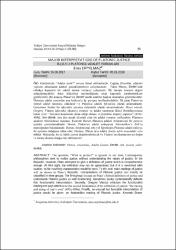| dc.contributor.author | Eryılmaz, Enes | |
| dc.date.accessioned | 2021-12-12T16:50:48Z | |
| dc.date.available | 2021-12-12T16:50:48Z | |
| dc.date.issued | 2018 | |
| dc.identifier.issn | 1305-7766 | |
| dc.identifier.issn | 2587-2451 | |
| dc.identifier.uri | https://app.trdizin.gov.tr/makale/TWpnMk9UYzJOZz09 | |
| dc.identifier.uri | https://hdl.handle.net/20.500.11857/2407 | |
| dc.description.abstract | The question, “What is justice?” is ignored in our time. Contemporary philosophers seek to realize justice without understanding the nature of justice. In the Republic, however, Plato attempted to give a definition of justice which is comprehensive enough. At first sight, the definition may not be appreciated; but if it is examined with caution, its far-reaching characteristics would be seen. To this end, main readings of justice will be shown in Plato’s Republic. Interpretations of Platonic justice can mainly be classified in three groups. The first group focuses on Plato’s formal definition of justice and understands Platonic justice as well-functioning. Gerasimos Santas systematically defends this functionalist interpretation. Secondly, Gregory Vlastos criticizes the functionalist reading and pays attention to the second formulation of the definition of justice: “the having and doing of one’s own” (433e-434a). Finally, an unusual but favorable interpretation of justice would be given: an Aristotelian reading of Platonic justice. Kenneth Dorter interprets Platonic justice within an Aristotelian framework. Dorter observes Plato’s conception of justice through the lens of Nicomachean Ethics. Dorter asserts that the Aristotelian doctrine of the mean is in accordance with Platonic justice; so, for Plato, justice is the mean between excess and deficiency. In this paper, these three different kinds of interpretations would be assessed and proposed Vlastos’ reading as the most accurate and legitimate. | en_US |
| dc.description.abstract | Günümüzde “Adalet nedir?” sorusu ihmal edilmektedir. Çağdaş filozoflar, adaletin yapısını anlamadan adaleti gerçekleştirmeye çalışmaktadır. Fakat Platon, Devlet’inde oldukça kapsamlı bir adalet tanımı vermeye çalışmıştır. İlk bakışta tanımın değeri anlaşılamayabilir; fakat dikkatlice incelendiğinde onun kapsamlı karakteristikleri görülecektir. Bu amaçla, Platon’un Devlet’indeki adaletin başlıca okumaları gösterilecektir. Platoncu adalet yorumları ana hatlarıyla üç gurupta sınıflandırılabilir. İlk grup Platon’un formel adalet tanımına odaklanır ve Platoncu adaleti iyi-işleyiş olarak anlamaktadır. Gerasimos Santas bu işlevselci yorumu sistematik olarak savunmaktadır. İkinci olarak, Gregory Vlastos işlevselci okumayı eleştirir ve adalet tanımının ikinci formülasyonuna kulak verir: “birisinin kendisinin olana sahip olması ve [kendine düşeni] yapması” (433e- 434a). Son olarak, sıra dışı ancak elverişli olan bir adalet yorumu verilecektir: Platoncu adaletin Aristotelesçi okuması. Kenneth Dorter, Platoncu adaleti Aristotelesçi bir çerçeve içinden yorumlamaktadır. Dorter, Platon’un adalet anlayışına Nikomakhos’a Etik’in merceğinden bakmaktadır. Dorter, Aristotelesçi orta yol öğretisinin Platoncu adalet anlayışı ile uyumlu olduğunu iddia eder; böylece, Platon için adalet ifratla tefrit arasındaki orta yoldur. Makalede, bu üç farklı yorum değerlendirilecek ve Vlastos’un okumasının en doğru ve meşru okuma olduğu öne sürülecektir. | en_US |
| dc.language.iso | eng | en_US |
| dc.relation.ispartof | Trakya Üniversitesi Sosyal Bilimler Dergisi | en_US |
| dc.rights | info:eu-repo/semantics/openAccess | en_US |
| dc.subject | [No Keywords] | en_US |
| dc.title | MAJOR INTERPRETATIONS OF PLATONIC JUSTICE | en_US |
| dc.title.alternative | BAŞLICA PLATONCU ADALET YORUMLARI | en_US |
| dc.type | article | |
| dc.department | Fakülteler, İlahiyat Fakültesi, Felsefe ve Din Bilimleri Bölümü | |
| dc.identifier.volume | 20 | en_US |
| dc.identifier.startpage | 55 | en_US |
| dc.identifier.issue | 1 | en_US |
| dc.identifier.endpage | 80 | en_US |
| dc.relation.publicationcategory | Makale - Ulusal Hakemli Dergi - Kurum Öğretim Elemanı | en_US |
| dc.institutionauthor | Eryılmaz, Enes | |



















